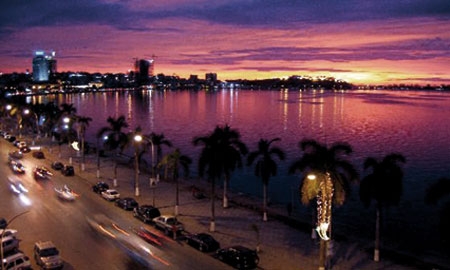Like many capital cities in the developing world, Luanda has become the destination for people from the countryside who are seeking work and a better way of life for themselves and for their families. And like many other capital cities in the developing world, the number of people living there now is far higher than the city’s planners expected when they began its development.
In contrast, unlike the vast majority of cities in the developing world, the cost of living in Luanda is far from cheap. Not long ago, the capital joined the ranks of Tokyo, Moscow, Geneva and Zurich as the world’s dearest cities for expats. In March 2010 Luanda was crowned most expensive city by Mercer Human Resource Consulting.
Prices have been driven up rapidly by the entrance of so many multinational companies, especially in the oil and diamond sectors, who are willing to pay top dollar for the modern conveniences and luxuries their employees are used to back home. With annual gym memberships running $2,500 and quality housing in safe areas setting renters back nearly $10,000 a month, living in Luanda is anything but affordable by most people’s standards.
Nonetheless, working with the country’s resources is so lucrative, Luanda’s connections to the global market so excellent, and the lifestyle enjoyed so rewarding, that most expat workers find it’s all worth it.
For the 60% of the population that still lives under the poverty line, things are looking up. Luanda has a population of about 6 million people, 12 times more than the half-million the city was planned for. A building boom is currently underway that will greatly increase the number of homes and offices available. The development is largely taking place following a master plan intended to turn Luanda into a world-class, modern city, and that plan is partly overseen by the regional government’s Office for Planning and Urban Management, or
IPGUL in its initials in Portuguese.
“IPGUL deals with the segment of the private sector that intends to invest in the area of territorial intervention, in other words with the licensing of private construction,” says Helder Jose, the agency’s director general. “It doesn’t deal directly with public works for infrastructure or with civil construction companies; what we do is provide companies with the necessary licenses and administrative instructions to carry out their real estate investments.”
IPGUL was created in 2008 by an initiative of President Eduardo Jose dos Santos. Starting from scratch has been a difficult task, Mr. Jose says, and the agency has used its resources wisely, first to buy needed equipment, train employees such as engineers and geographers, and finally to set up a digital database that contains all the territorial information of Luanda.
“We think that was the right path to follow to start taming our problems,” Mr. Jose explains. “Without knowing the variables of the territory it’s impossible to carry out efficient planning strategies. Our geographic information system includes verifying in detail the location and number of social infrastructures such as hospitals, police stations, schools, universities, stadiums, churches, markets, etc.”
With that information, IPGUL can contribute much to the realization of the concept of “Luanda-World City” – a plan whose goal is to give the capital the kind of urban infrastructure and amenities that will make it a modern city capable of joining the ranks of the world’s major metropolitan areas.
Included in the project are plans to develop coordinated infrastructure networks for water, gas and electricity, and at the same time develop transportation and mobility systems. Policies for collecting and processing solid waste are also being developed, with the goal of improving the city’s hygiene and fostering new habits of consumption and civic responsibility.
The government also has ambitious plans to invest in education, culture and leisure, all carried out through the implementation of an integrated strategy to manage the provincial territory and reach a balance between public and private investment while also respecting the integrity of the important parts of the already existing city.
“The Luanda of 1975 is different from the Luanda of 1992, and from the Luanda of today,” comments Mr. Jose. “The question we ask ourselves is ‘don’t the inhabitants of today have the right to leave their mark on our urban transformation?’ What people must understand is that not everything will be preserved and not everything will be destroyed because they know that tourists who come to Luanda of course should be able to notice some historical marks left over the years.”
The importance to the national government of developing Luanda cannot be understated. President dos Santos has been deeply involved in the work to improve the city for its residents since even before the end of the civil conflict in 2002.
Indeed, the city has already changed immensely since that time, under the guidance of various government agencies, including IPGUL, that are overseeing and licensing the construction of new buildings, roads, sewer systems, and water and power networks.
“I think Luanda’s residents are already noticing the impact of our work, although not yet as much as we would like,” says Mr. Jose. “We can feel that people now have a better understanding of the role that IPGUL is playing” in the city’s development.

0 COMMENTS